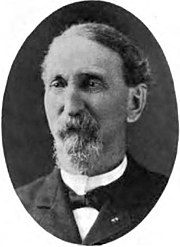Andrew L. Harris
Andrew Lintner Harris (born November 17, 1835 in Butler County , Ohio , † September 13, 1915 in Eaton , Ohio) was an American politician and from 1906 to 1909 the 44th governor of the state of Ohio.
Early years
Andrew Harris attended Miami University until 1860 . Then he began to study law, which was interrupted by the civil war . During the war, Harris served with the rank of colonel as regimental commander of the Union Army . He was involved in many battles, including the Battle of Gettysburg . In 1866 he became a brevet - Brigadier promoted. After the war he continued his law studies. After his admission to the bar, he began practicing with a joint law firm in Eaton.
Political rise
Harris was a member of the Republican Party . In 1866 he was elected to the Ohio Senate for four years . Between 1875 and 1882 he was a probate judge in Preble County . Between 1885 and 1887 he was a member of the Ohio House of Representatives before he was elected vice governor of his state in 1891 . Between 1892 and 1896 he was the representative of Governor William McKinley in this capacity . After McKinley was elected President of the United States , he appointed Harris to the federal government's industrial commission. In 1905 he was re-elected lieutenant governor.
Governor of ohio
After the death of Governor John M. Pattison on June 18, 1906 Harris had to end his beginning term. Due to a constitutional amendment that came into effect in 1905, the gubernatorial elections in Ohio had to be held in even years. This extended this term of office by one year. Harris could thus remain in office until January 11, 1909. During that time, Ohio passed a food safety bill and new drug abuse regulations. At that time, the first environmental protection measures were also taken. At the time, companies were forbidden by law from making financial contributions to political candidates. The so-called "Rose Law" left it to the individual districts to decide for themselves on the question of prohibition . As a result, more than half of all districts opted for a prohibition law. That, in turn, angered the alcohol industry. Their influence was one of the reasons for Harris' defeat in the next gubernatorial election in 1908.
Another résumé
After the end of his governorship, Harris withdrew from politics. He spent the last years of his life on his farm near Eaton. Andrew Harris died in September 1915. He was married to Caroline Conger, with whom he had one child.
Web links
- Andrew Harris in the National Governors Association (English)
- Andrew Harris in the Ohio History Connection Archives
- Andrew L. Harris in the database of Find a Grave (English)
| personal data | |
|---|---|
| SURNAME | Harris, Andrew L. |
| ALTERNATIVE NAMES | Harris, Andrew Lintner (full name) |
| BRIEF DESCRIPTION | American politician |
| DATE OF BIRTH | November 17, 1835 |
| PLACE OF BIRTH | Butler County , Ohio |
| DATE OF DEATH | September 13, 1915 |
| Place of death | Eaton , Ohio |

